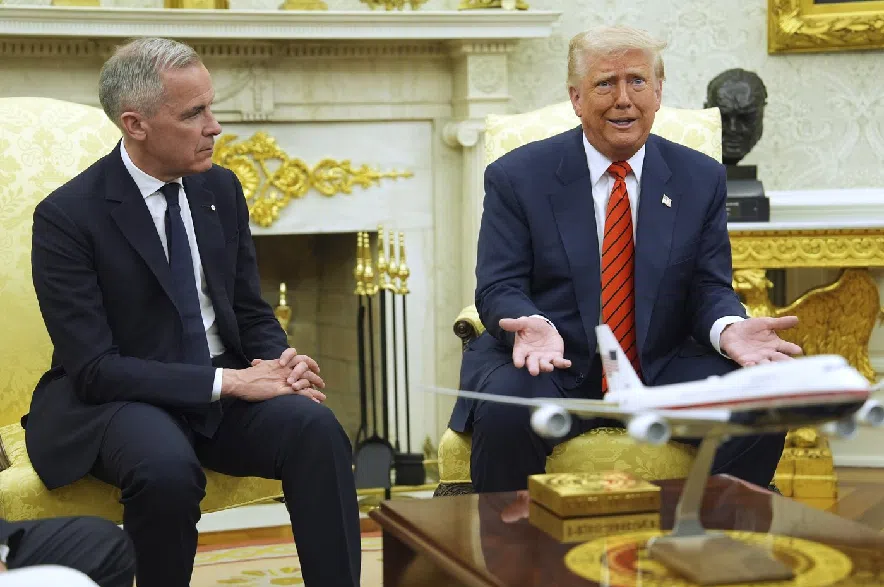WASHINGTON — Mark Carney is set to have his second meeting in the Oval Office with U.S. President Donald Trump on Tuesday as the prime minister balances the expectations of Canadians with the realities of trying to negotiate any tariff relief.
Trump on Monday indicated that he remained committed to realigning global trade and taking business from Canada through his massive tariff regime.
Read more:
- Auto sector tempering expectations of Carney-Trump meeting
- With deficit set to soar, Ottawa shifts budgets from spring to fall
- Poilievre wishes Carney well in Washington – but says he wants to see results
“I guess he’s going to ask about tariffs,” Trump said when asked about the upcoming meeting with Carney. “Because a lot of companies from Canada are moving into the United States, you know, everybody’s moving back into the U.S., and he’s probably going to be asking about tariffs. They’re losing a lot companies in Canada.”
Carney and Trump have been in constant contact since the two leaders met at the White House in May as Ottawa looks for a tariff-off ramp. Carney dropped Canada’s digital services tax and many retaliatory tariffs. He boosted border security and fast-tracked defence spending to hit NATO targets.
Meanwhile, Trump boosted duties on Canada to 35 per cent in August but those duties don’t apply to goods compliant under the Canada-U.S.-Mexico Agreement on trade, known as CUSMA. Canada is also being hammered by tariffs on steel, aluminum, automobiles and copper.
Lumber tariffs are set to go into place later this month and Trump Monday announced plans to impose a 25-per-cent tariff on medium and heavy-duty truck imports on Nov. 1
Despite all of Canada’s concessions, there has been no indication that Trump will back down on his growing list of tariffs.
“To me the prospect of significant tariff movement on anything is pretty low,” said Brian Clow, former deputy chief of staff to former prime minister Justin Trudeau. “And that’s because Donald Trump likes the tariffs he has in place. He thinks he’s winning.”
Clow worked in the Prime Minister’s Office from 2017 until March of this year. He led the file on Canada-U.S. relations under Trudeau and had a front-row seat during the first Trump administration.
“I am of the view that even if Carney comes out tomorrow and is able to say the talks are re-energized … That on its own is a good thing,” Clow said.
Clow pushed back on some observers who claimed it will look bad if Carney doesn’t leave the White House with lower tariffs. Prime ministers can’t govern based on that, Clow said, adding he’s glad Carney is going to Washington, “even if he doesn’t come away with a specific outcome.”
It’s not clear whether the meeting will bring any changes. The Prime Minister’s Office said in a news release Carney’s visit will focus on shared priorities in a new economic and security relationship between Canada and the United States.
Clow and other experts who are tempering expectations of tariff relief say Carney is playing the long game to sustain the future of CUSMA, which is up for review next year.
Canada and the U.S. separately launched CUSMA consultations last month.
Carney has said the CUSMA carveout puts Canada in a better position than most nations — including those that did end up making deals with the Trump administration. But in May’s Oval Office meeting with Carney, Trump called CUSMA a “transitional deal” and said he didn’t know “if it’s necessary anymore.”
Christopher Sands, director of Johns Hopkins University’s Center for Canadian Studies, said he is looking “for some sign from the United States that it is actually willing to reciprocate in some way what Mark Carney and Canadians have put on the table.”
It doesn’t have to be a deal, Sands said, but some indication the Trump administration views the Carney approach as more successful than the Trudeau approach.
Carney walking away without some sort of deal doesn’t leave the prime minister looking weak, said Richard Stern, the acting director of the Thomas A. Roe Institute for Economic Policy Studies at The Heritage Foundation, a leading conservative think tank in Washington.
The meeting between Carney and Trump is a good sign — and there might be some sort of “handshake deal” — Stern said, but he’s “not sure how much of an agreement you might get.”
“I think it actually means that something’s going on that would push him into sitting down with Trump,” Stern said. “But, like I said, I don’t think you’re going to get a framework.”
Trump is not looking to target Canada specifically, Stern said, but his tariffs are part of a decades-long movement among United States voters against free trade.
Those sector-specific tariffs are important to that “much broader entrenched narrative” from Trump that he will be able to bring back jobs in these sectors, Stern said.
“That why I think everybody including myself are, you know, ‘I’ll believe it when I see it’ about when you might get that kind of relief on those,” Stern said.
This report by The Canadian Press was first published Oct. 7, 2025.
Kelly Geraldine Malone, The Canadian Press











